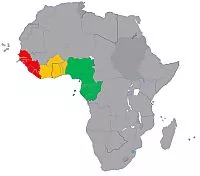Over the past 50 years Davos has come to serve as a way station for global capital and its partners in government. Meanwhile today, frontier markets in Africa, the Middle East and further afield must on the one hand grapple with constrained investor risk appetite, and on the other reach for opportunities emerging from the reorientation of global supply chains, tech innovation, energy bottlenecks, and the world's decarbonisation ambitions etc. Against this backdrop, Middle Eastern officialdom appears to have been well represented at the summit1 – at least at a ministerial level. However, as can be seen in the below charts, African governments have been largely absent.

There are very good reasons why the benefits of attending the World Economic Forum (WEF) might look remote for much of Africa right now, and the aesthetics if not the flights and accommodation unaffordable.
- The US-Africa Summit took place as recently as November 2022 and the US Treasury Secretary Janet Yellen is visiting Senegal, Zambia and South Africa over this month. She is tagging with the Chinese foreign minister Qin Gang, wrapping up his Africa tour and maiden trip as foreign minister – Angola, Benin, Ethiopia and Gabon.
- Some government figures are at alternative gatherings like the Abu Dhabi Sustainability Week, others are facing down ongoing instability/insecure international legitimacy, and perhaps wish to avoid a cold welcome from European or US colleagues over policy matters.
- Still more like Ghana, in the midst of difficult debt negotiations and 54% inflation might wish to avoid the political expense of sending cabinet officials on a trip to Switzerland while being accused of profligacy by your ever numerous, ever vocal critics.
Understood. Even so, African leadership will still have to engage with the individuals, i.e., global CEOs, and the topics under discussion at Davos urgently. If its crypto regulation that is on the agenda, then the shortcomings of fiat money are plain here, and specific African markets exhibit some of the highest crypto adoption rates in the world. The region has perspective and interests that must be articulated. Similarly, on the reshaping of global supply chains or identifying opportunities for cooperation above competition amid 'geopolitical fracture'. Africa is far from peripheral. Last, if global CEOs are 'risk-off' right now, doesn't that put a premium on cutting through to build rapport and familiarity.
Footnote
1 From official lists published on 10 January.
The content of this article is intended to provide a general guide to the subject matter. Specialist advice should be sought about your specific circumstances.

